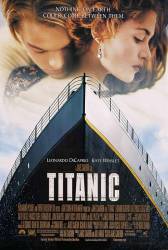Factual error: Rose mentions Austrian psychoanalyst Sigmund Freud's ideas on the male preoccupation with size to Bruce. However this is 1912, and Freud did not publish the work relating to this until 1920 in "Beyond The Pleasure Principle." Also, up until 1919, Freud relied solely on data from women. (00:33:40)

Titanic (1997)
Trailers
Directed by: James Cameron
Starring: Kathy Bates, Bill Paxton, Kate Winslet, Leonardo DiCaprio, Billy Zane, Victor Garber, Bernard Hill
More trailers
Lewis Bodine: We never found anything on Jack. There's no record of him at all.
Rose Calvert: No, there wouldn't be, would there? And I've never spoken of him until now. Not to anyone, not even your grandfather. A woman's heart is a deep ocean of secrets. But now you know there was a man named Jack Dawson. And that he saved me. In every way that a person can be saved. I don't even have a picture of him. He exists now, only in my memory.
Question: How did rats manage to get on board?
Join the mailing list
Separate from membership, this is to get updates about mistakes in recent releases. Addresses are not passed on to any third party, and are used solely for direct communication from this site. You can unsubscribe at any time.
Check out the mistake & trivia books, on Kindle and in paperback.




Chosen answer: During the several years it took to construct the ship probably, or in any of the supplies/food brought on board, or in the furniture brought on board. A single pregnant female rat can be responsible for thousands of rats in a very short space of time (the offspring are not too choosy about who they breed with).
Soylent Purple
A pregnant female rat could have made a home in a underneath a third class couch and had the other rats then all the females would have baby rats quickly.